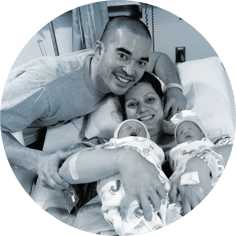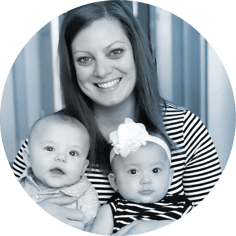Tough to Conceive with Danny Manimbo
Published: Jun 23, 2021
Last Updated: Jan 19, 2024
Our Story
Many who know me have also probably met my two-year-old twins, Everly and Porter (a girl and a boy). Over this past year, many others have probably witnessed my kids charging into my office to make several, mostly surprise, appearances during Zoom happy hours and client meetings. But what most do not know, however, are the struggles my wife, Brittany, and I went through on our journey to have them. How we got to this point with two happy, healthy children is not a short story or answer—as anyone affected knows, infertility can create so many hardships for couples, and I hope that this blog and our fundraising campaign detailed below will shed some light on the widespread impact it really can have.
 Like mental health, infertility often has certain social stigmas attached to it—my wife and I know this well. Over the years, we’ve often heard, “oh, you shouldn’t talk about that,” or “just don’t say anything” when referring to how Everly and Porter were conceived—sometimes, we even hear comments so blunt as “don’t ever tell them they came from donor eggs.” But despite all that, Brittany and I have always chosen to be very open about what it took to have our children, even with the kids themselves—we actually have a great children’s book that explains the donor egg process, and we read it to them before they go to bed. Regardless of any comments we have heard from others, we do not plan on keeping how they came to be a secret from our children. We believe they should understand just how badly their mom and dad wanted them—so much so that we spent years, and plenty of money, trying to conceive them.
Like mental health, infertility often has certain social stigmas attached to it—my wife and I know this well. Over the years, we’ve often heard, “oh, you shouldn’t talk about that,” or “just don’t say anything” when referring to how Everly and Porter were conceived—sometimes, we even hear comments so blunt as “don’t ever tell them they came from donor eggs.” But despite all that, Brittany and I have always chosen to be very open about what it took to have our children, even with the kids themselves—we actually have a great children’s book that explains the donor egg process, and we read it to them before they go to bed. Regardless of any comments we have heard from others, we do not plan on keeping how they came to be a secret from our children. We believe they should understand just how badly their mom and dad wanted them—so much so that we spent years, and plenty of money, trying to conceive them.
When we first started seeing a fertility specialist in 2014, I had no idea what intrauterine insemination (IUI) or in vitro fertilization (IVF) treatments even were. Back then, I was unfortunately a bit naïve—I’d just hoped the doctor would diagnose / treat the issue right there and we’d be all set, but of course, it wasn’t that simple at all. Over the next several years, we tried and failed one IUI and four IVF treatments. For those who are unfamiliar, these processes do not yield quick successes or failures—it’s months of waiting, doctor visits, and medications that include lots of injections that Brittany had to brave. After so much time spent hoping, each failed treatment felt like being punched in the stomach. I didn’t know what to think, what to say to my wife, or if it would ever work out for us—each time became more and more deflating. The psychological impact it all had on us both was tremendous, and to make matters worse, we had to deal with the financial fallout of these failures at the same time. Infertility treatments are extremely expensive and often not covered by employer-provided health insurance. So not only were we mentally exhausted, but we were beginning to worry about whether or not pushing forward was something we could even afford without liquidating our retirement savings accounts or taking out a loan.
With so much weighing on you, it’s easy to shift into a victim’s mentality of “why us?” and become resentful, which we did. After our many failures, we became so bitter watching others in our families and our friends who were becoming pregnant that we avoided certain gatherings or those friends who were either pregnant or had kids. Inwardly, we hated shutting ourselves out from so much of the outside world—these were our family and friends, after all. We knew we should’ve been happy for them, but it was just too painful to see everyone around us getting so easily what my wife and I were having to pay and try so hard for, especially when to that point it had been to no avail.
"Every day, I reflect on that fateful moment in the car, when my wife firmly let me know that quitting wasn’t an option."
Mentally, it was a very unhealthy place to be, and eventually we did come to a breaking point. I’ll never forget it—it was after we got the news of our 3rd failed IVF, and we were in the car. I said something then to my wife that I will always regret: “Maybe having kids just isn’t meant to be for us, maybe we should just quit and move on.” I said it because I felt that I couldn’t take on another failure, but Brittany, who is not one to hold her tongue, quickly responded with “well, that’s not an option.” Though I didn’t say it to her at the time, I knew then that we were going to beat this thing because I had a wife who wouldn’t quit until we did just that.
We soon learned that using Brittany’s eggs wasn’t likely to lead to success, and our doctor suggested we use donor eggs instead. This was a big decision, and definitely not one we had originally considered when we started the process. Though the doctor suggested we take some time to think or even speak with someone, my wife and I looked at each other and knew this was our best—and maybe only, or last—option. From that moment, we were comfortable moving forward, and no more time was needed—we would use the donor eggs.
When our first donor transfer was unsuccessful due to some medical complications, I suggested that for the second transfer—our 5th IVF round—we should transfer two embryos instead of one. In my mind, I figured it would increase our chances of at least one of them being successfully transferred, and anyway, we wouldn’t be charged extra for transferring a second—it seemed a fertility BOGO, to me. Of course, the doctor did advise us that by transferring two, we were risking an increased chance of the embryo splitting and conceiving two babies rather than just the one. But an embryo split was always a possibility with IVF treatments at all, even with just one embryo, and heck, my wife and I would’ve rather have had triplets or quadruplets then no kids. So, we went for it, more than ready to be done with the IVF process and hoping that this transfer would be our last time ever doing it—we were “all in,” so to speak. The healthiest male and female embryos were transferred, and we were left to hope for the best.
 Fast forward to April of 2018 and the phone call I’ll always remember. We were actually at Schellman’s annual company retreat in Orlando when the doctor rang, having reviewed the blood work Brittany had gotten done earlier that day. “Brittany is pregnant!” the nurse told me. Almost immediately, I teared up and got goosebumps. Brittany herself was in the shower, so I ran into the bathroom and made the nurse repeat it again over the speakerphone so my wife could hear the news with her own ears. It was a surreal moment. All of the pain and stress of the previous four years seemed to get erased with a single phone call because we were finally going to be parents. Though the pregnancy was only two weeks along at the time, well before the milestone when it becomes “safe” to tell people, I couldn’t contain my excitement that night—I think I told every co-worker I saw that I was going to be a dad.
Fast forward to April of 2018 and the phone call I’ll always remember. We were actually at Schellman’s annual company retreat in Orlando when the doctor rang, having reviewed the blood work Brittany had gotten done earlier that day. “Brittany is pregnant!” the nurse told me. Almost immediately, I teared up and got goosebumps. Brittany herself was in the shower, so I ran into the bathroom and made the nurse repeat it again over the speakerphone so my wife could hear the news with her own ears. It was a surreal moment. All of the pain and stress of the previous four years seemed to get erased with a single phone call because we were finally going to be parents. Though the pregnancy was only two weeks along at the time, well before the milestone when it becomes “safe” to tell people, I couldn’t contain my excitement that night—I think I told every co-worker I saw that I was going to be a dad.
Everly and Porter were born in December of 2018, and our lives haven’t been the same since. As any parent of twins can probably understand, we have certainly had tough days with them, but no matter how much they push dad’s buttons, I am always grateful that we have them. Every day, I reflect on that fateful moment in the car, when my wife firmly let me know that quitting wasn’t an option. Her resilience paved the way for our greatest gift, and I’m so proud of her for keeping the faith, fighting on, and pushing past all the obstacles put in front of us.
Our Cause
Despite our long, hard fought journey coming to an end when we became parents, those years of stress and setbacks had taken its toll on me—not just mentally, but physically as well. To take my mind off of the pain we were going through personally, I’d let myself become entirely consumed with my work, and my health was desperately out of balance. So when Everly and Porter were born, I committed myself to living a healthier lifestyle, and I kept a steady workout schedule until COVID-19 struck the U.S. in March 2020. My routine came to a screeching halt as my gym closed, and like many, I fell into the “COVID blues” after a few weeks of sitting around the house. But even still, I remained committed to my health, and so one day, I decided to get outside and start running as it was one of the only things we could do here in Colorado without restriction. But I hadn’t run for about eight years, and it was a serious struggle at first. One day, I was limping around the house after a training session and Brittany told me, “I think you might be getting a little old for all of this.” In a reverse of the emotional conversation that we’d had in the car after infertility had gutted us again, it was my turn to show resilience. “I’m not giving up,” I said, and I signed up for a marathon that night.
Since then, I’ve completed seven marathons and my first ultramarathon (50k). Right now, I’m training for a couple races this summer, and I can say that I am definitely, comfortably in the running swing of things. It helps that it’s not just cardio—running also gives you a lot of time to think, and it was the other day that I was out jogging when I again began reflecting on all of the difficulties of infertility and its effects on my life. The desire struck me to raise awareness and do something positive, and I wondered if my rediscovered hobby of running could provide just the way. When I got home and conveyed my idea to Brittany, she told me to look into RESOLVE.
Established in 1974, RESOLVE: The National Infertility Association is a non-profit organization with the only established, nationwide network mandated to promote reproductive health and to ensure equal access to all family building options for men and women experiencing infertility or other reproductive disorders. Unfortunately, my wife and I’s story is just one of many— in the U.S., one in eight couples of childbearing age has trouble conceiving or carrying a pregnancy to term. To help address this public health issue, RESOLVE provides community to these women and men, connecting them with others who can help while empowering them to find resolution and giving voice to their demands for access to all family building options. Just recently here in Colorado, RESOLVE’s advocacy helped pass The Colorado Building Families Act into law—the bill decrees that the state will now provide insurance coverage for infertility treatments, including IVF and fertility preservation, effective January 1, 2022.
 After reading and hearing about the impact of RESOLVE’s initiatives, I knew this was the right organization to support. They’re doing real work and making a real difference to ensure that couples just like Brittany and I won’t have to struggle—they provide support to people just like us, helping ensure that they too can have a family of their own without worrying about things like insurance coverage or cost. To do my part in helping their mission, I reached out to them about my new goal: I signed up for an ultramarathon through the Badlands of North Dakota and I want to raise $100 for every mile run, with an initial goal of $5,600 with incremental goals that max out at $10,600 that will go entirely to RESOLVE. I’m currently registered for the 56-mile race and I’m committed to increasing my distance up to the maximum race distance of 106 miles if we continue to reach our incremental fundraising goals. More details on the races and my fundraising efforts are included my fundraising page.
After reading and hearing about the impact of RESOLVE’s initiatives, I knew this was the right organization to support. They’re doing real work and making a real difference to ensure that couples just like Brittany and I won’t have to struggle—they provide support to people just like us, helping ensure that they too can have a family of their own without worrying about things like insurance coverage or cost. To do my part in helping their mission, I reached out to them about my new goal: I signed up for an ultramarathon through the Badlands of North Dakota and I want to raise $100 for every mile run, with an initial goal of $5,600 with incremental goals that max out at $10,600 that will go entirely to RESOLVE. I’m currently registered for the 56-mile race and I’m committed to increasing my distance up to the maximum race distance of 106 miles if we continue to reach our incremental fundraising goals. More details on the races and my fundraising efforts are included my fundraising page.
Others who know I’m running an ultramarathon have asked, “won’t that be hard or won’t that hurt?” Even now as a seasoned runner, I’m sure it will hurt a lot, but I also know that any type of pain I encounter during this race won’t compare to the agony that couples out there are suffering through as the door closes on their dreams of starting a family – that’s real pain and stress. I know, because I’ve been there, right alongside my wife. And though Brittany and I are fortunate in that we’ve “resolved” our infertility journey, if we can help make a difference so that others don’t go through what we went through, I’m willing to cover any distance on my feet to help do that.
If you would like to donate, please visit my fundraising page, which we will keep open through the race date of July 31st.
About Danny Manimbo
Danny Manimbo is a Principal with Schellman based in Denver, Colorado. As a member of Schellman’s West Coast / Mountain region management team, Danny is primarily responsible for leading Schellman's AI and ISO practices as well as the development and oversight of Schellman's attestation services. Danny has been with Schellman for 10 years and has over 13 years of experience in providing data security audit and compliance services.




